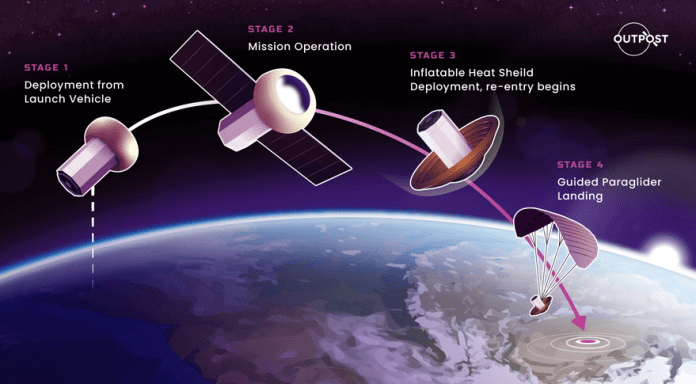
“It will be extremely obvious that satellites should be reusable after we show how it’s done,” said Outpost CEO Jason Dunn.
SAN FRANCISCO – Two Made In Space co-founders teamed up with a paragliding expert to found Outpost, a startup focused on returning satellites and payloads from orbit.
“There are a lot of ways to get satellites and payloads to space today, and very few ways to get things back to Earth,” Jason Dunn, Outpost co-founder and CEO, told SpaceNews. Outpost intends to begin solving that problem with a “low-mass, high-efficiency” Earth return capability for satellites, said Dunn, who co-founded Made In Space and served as director before it was purchased by Redwire in 2020.
As the space industry races toward the much discussed trillion-dollar mark thanks to the proliferation of satellite constellations and services, rockets are increasingly reusable. Satellites, though, usually burn up in Earth’s atmosphere upon reentry.
“Our belief is that the satellite of the future is reusable, just like a rocket is today,” Dunn said. “We’re creating a much lower-cost way to do space missions because the satellite can fly many missions over its lifetime. It will be extremely obvious that satellites should be reusable after we show how it’s done.”
Dunn founded Outpost earlier this year with Aaron Kemmer, Made In Space co-founder and former chairman, and Michael Vergalla, a veteran of Moon Express, SpinLaunch and Airbus A3, the aerospace giant’s innovation center in Silicon Valley. Vergalla is also the founder of Free Flight Research Lab, a nonprofit focused on using paragliders for science, technology and conservation.
Based in part on Vergalla’s paraglider expertise, Outpost developed a two-stage system to help satellites reenter Earth’s atmosphere and land on a pad. The invention unlocks the door to “full recovery of payloads and materials from space,” Dunn said.
Outpost plans to return satellites weighing about 200 kilograms. In contrast to space capsule return flights that rely on rigid ablative heat shields, ballistic atmospheric entry and parachutes opening at low altitudes, Outpost has developed “lightweight and compact” systems that “deploy using pneumatic inflation,” Vergalla said.
Outpost executives are talking with prospective customers who are developing space hardware, sensors and payloads.
“A lot of groups that we’ve talked to are developing something new and novel that needs to be tested in space,” Dunn said. “As you know, there is a Catch-22 in this industry: you can’t fly something on a space mission unless it’s already flown before. So getting flight heritage on new systems is something we can offer.”
Once Outpost provides spaceflight heritage for a component, material or sensor, it will “bring the payload back so that the engineer or researcher can analyze it,” Dunn added.
– Advertisement –